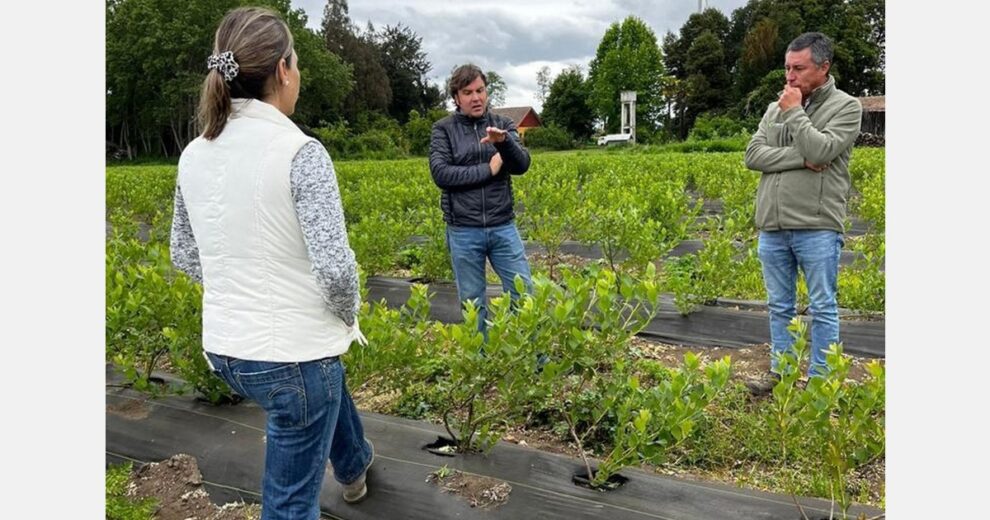Blueberries will likely be in short supply next year as well due to the world leaders in production Peru that will continue to feel the effect of the El Niño weather phenomenon. “All the people who specialise in weather issues in Peru says El Niño is for two years not just one year,” says Sebastian Ochoa, owner of Consultora Agrícola Santa María, a company that provides technical support in blueberry production, due diligence, and commercial consulting worldwide.
Ochoa has a unique experience and view of the global blueberry industry and shares a view insights. He is an advisor and consultant to blueberry producing and exporting companies in 16 countries (5 continents) with more than 14,000 hectares advised in conventional, organic and biodynamic production, both in hydroponics and soil. He is a global advisor for the production projects of the company and third party producers of the Australian genetic program, Ozblu.
 (On left) Sebastian Ochoa busy advising clients in another blueberry field.
(On left) Sebastian Ochoa busy advising clients in another blueberry field.
He says when El Niño started a lot of growers did not know how to read the plant and obtain higher production. “With my growers we have good production, while many growers had many problems with production. This year, last summer El Niño started, when the sea surface started to be more warm, this produced an increase of temperatures 6-7 degree more for the min and max causing the plants to grow too fast leading to less production. Ventura is the most affected. This phenomenon will continue for the next year too, while producers in Peru started to say it was a delay, it was not because the fruit is not there. Now the production is decreasing and they don’t have enough fruit. This caused big problems for growers. Peru sends a lot to markets with an increase in consumption in the world. With this lack, the prices increased,” explains Ochoa.
Global blueberry production trends
“The consumption growth is very high and blueberries are the most important fruit in terms of the market growth, and the attributes in terms of health that produce a high consumption of the fruit. When new countries start production they always start with old varieties like Biloxi and Legacy in China where they are growing with these kind of varieties. When their blueberry industries are mature they start growing with new varieties by using new genetics. The yield is high, quality is amazing, with the size of the fruit and the flavour. The trend is to continue to plant while established production countries are taking up the new genetics. The most important of these are Ozblu and Sekoya,”
He says they key to successful blueberry growing is not only to have the new genetics. “New genetics are first and second producers need to know how to get the potential out of the genetics. In my work I saw a lot of very good and new varieties. But it needs the management to get the potential out.”
 (On left) Sebastian Ochoa busy advising a client in a blueberry field.
(On left) Sebastian Ochoa busy advising a client in a blueberry field.
He advises producers in all production areas around the world to … “Try to be responsible, and produce and export a very good quality fruit to the market. An example in Chile a few years ago was when growers produced bad quality fruit that they still sent to the market. They destroyed the brand of the country and varieties. Producers are advised to build a good country brand. They must take care to send good quality to markets. Try to produce good genetics, not old varieties. Send very good quality fruit to the market. Take care of the brand of your area and country. There are a couple of companies with good quality and the right genetics who are expanding because they send the best to the market and they continue to make good money. Many others don’t have the business knowledge and they don’t have the varieties. Don’t do that to your business or to your country. If you know the fruit has a problem send it to for juice instead of to the market,” warns Ochoa.
Final words of advice for blueberry producers
“We must be careful with the plant, to not let it have too much vigour and produce inferior fruit. Peru’s challenges present an opportunity for other countries. The next year will be good in terms of price, because of the lack of production,” concludes Ochoa.
For more information:
Sebastian Ochoa
Consultora Agrícola Santa María
Tel: +56 9 8209 9472
Email: sebastian@consultorasm.cl
Source : Fresh Plaza











